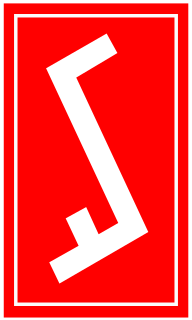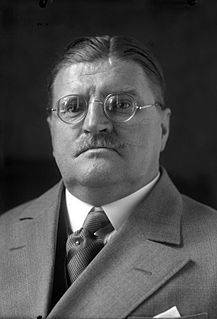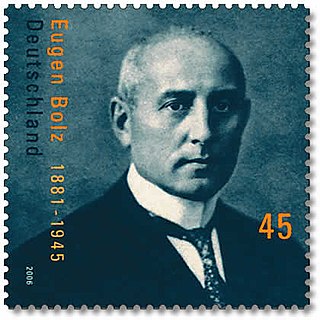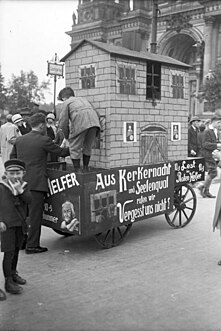See also
Political parties in Germany in the Weimar Republic (1918–1933) | |
|---|---|
| |
The Association of National Minorities in Germany (German : Verband der nationalen Minderheiten in Deutschland) was an umbrella organization and pressure group created in 1924 at the initiative of the Union of Poles in Germany which aimed at representing the interests of the Polish, Danish, Sorbian, Frisian and Lithuanian minorities in the German Weimar Republic. It was dissolved by the Nazi regime in 1939. [1] [2]
In the Prussian Landtag, the Polish List had already got two mandates at the 1922 elections, Johann Baczewski and Josef Wajda (who died in 1923 and was replaced by Stanislaus Graf von Sierakowski). At the following 1925 elections, the Polish List was supported by the Association of National Minorities but it did not get more seats, Johann Baczewski was reelected and Ceslau Klimas also made his entry to the Landtag. [3]
The Sorb Jan Skala, a founding member of the Lausitzer Volkspartei in 1919 and since 1925 an employee of the Union of Poles in Germany, was the editor in chief of the Association of National Minorities' magazine, Kulturwille (1925-1926), later renamed Kulturwehr till its closure by the Nazi regime in 1936. [4]

East Prussia was a province of the Kingdom of Prussia from 1773 to 1829 and again from 1878 ; following World War I it formed part of the Weimar Republic's Free State of Prussia, until 1945. Its capital city was Königsberg. East Prussia was the main part of the region of Prussia along the southeastern Baltic Coast.

Union of Poles in Germany is an organisation of the Polish minority in Germany, founded in 1922. In 1924, the union initiated collaboration between other minorities, including Sorbs, Danes, Frisians and Lithuanians, under the umbrella organization Association of National Minorities in Germany. From 1939 until 1945 the Union was outlawed in Nazi Germany. After 1945 it had lost some of its influence; in 1950 the Union of Poles in Germany split into two organizations: the Union of Poles in Germany, which refused to recognize the communist Polish government of the Polish United Workers' Party, and the Union of Poles "Zgoda" (Unity), which recognized the new communist government in Warsaw and had contacts with it. The split was healed in 1991.

Otto Lebrecht Eduard Daniel Meissner was head of the Office of the President of Germany during the entire period of the Weimar Republic under Friedrich Ebert and Paul von Hindenburg and, finally, at the beginning of the Nazi government under Adolf Hitler.

Agnes Miegel was a German author, journalist, and poet. She is best known for her poems and short stories about East Prussia, but also for the support she gave to the Nazi Party.

Eugen Anton Bolz was a German politician and a member of the resistance to the Nazi régime.
Emil Carlebach was a Hessian Landtag member, a writer, and a journalist. He was born and died in Frankfurt am Main.

The Republic of Baden was a German state that existed during the time of the Weimar Republic, formed after the abolition of the Grand Duchy of Baden in 1918. It is now part of the modern German state of Baden-Württemberg.

The Free Workers' Union of Germany was an anarcho-syndicalist trade union in Germany. It stemmed from the Free Association of German Trade Unions (FDVG) which combined with the Ruhr region's Freie Arbeiter Union on September 15, 1919. The FAUD was involved in the revolution in Germany from 1918–1923, and continued to be involved in the German labor movement after the FAUD began to decline in 1923. After 1921, the FAUD added an "AS" to their name, signifying a full transition from simple syndicalism to anarcho-syndicalism. This also led to further difficulties between the intellectual elites of the FAUD (AS), such as Rudolf Rocker, and the rank and file workers, mostly in the Ruhr, who were more worried about "bread and butter" issues than anarchist political activities. These workers, the majority of the FAUD-(AS) members, formed the Gelsenkircherichtung within the movement, and given the movements federalist structure, began to drift away from the FAUD-(AS) intellectually and organizationally. Eventually, those workers who had joined during the revolution left the movement and the remaining FAUD-(AS) members came from the FDVG's original constituencies of the building trades and specialized textile workers. The Nazis suppressed the FAUD in January 1933 after coming to power. However, many of its members continued to do political work illegally and organized resistance against the Nazi regime, both in Germany and elsewhere. The International Workers Association, of which the FAUD was a member, was founded upon the initiative of the German organization in 1922. The Free Workers' Union (FAU), which was founded in 1977, sees itself in the tradition of the FAUD. At its peak, the FAUD had 150,000 members. The primary organ of the FAUD was the newspaper Der Syndikalist, which was first published in December 1918, and continued until the groups suppression by the Nazis.
The National Socialist German Students' Union was founded in 1926 as a division of the Nazi Party with the mission of integrating University-level education and academic life within the framework of the Nazi worldview. Organized strictly in accord with the Führerprinzip as well as the principle of Machtdistanz, the NSDStB housed its members in so-called Kameradschaftshäusern, and had its members decked out in classic brown shirts and its own distinctive Swastika emblems.

Horst Möller is a German contemporary historian. He is Professor of Modern History at the Ludwig Maximilian University of Munich (LMU) and, from 1992 to 2011, Director of the Institut für Zeitgeschichte.

The Rote Hilfe was the German affiliate of the International Red Aid. The Rote Hilfe was affiliated with the Communist Party of Germany and existed between 1924 and 1936.
Reinhold Quaatz was a German conservative politician who was active during the Weimar Republic. Although associated with right-wing and völkisch tendencies, Quaatz was half-Jewish in ancestry.
Adolf Bauser was a German teacher, member of the Reichstag for the Reich Party for Civil Rights and Deflation and delegate for the Christian Democratic Union in the Landtag of Württemberg-Baden.
With Hindenburg for a national Prussia was a candidature for the 1933 election to the Prussian Landtag. The candidature belonged to the same electoral bloc as the NSDAP. The candidature got 206,919 votes but no seats in the Landtag.
Das Volksrecht was a left-wing newspaper published from Offenbach am Main, Weimar Germany between 1925 and 1933. Initially it was an irregular publication of the communist city council group, but in 1928 it became a local mouthpiece of the Right Opposition. It was published on weekly basis until the National Socialist takeover in 1933.
The Reichskunstwart was an official position within the Ministry of the Interior of the Weimar Republic, which was concerned with artistic matters and other regulatory issues. It mediated between regulators and artists. Its official address was Berlin NW 40, Platz der Republik 6. The role also covered monitoring the aesthetic quality of the new currency, lags, stamps and other such emblematic creations of the Weimar state.

Jan Skala was a Sorbian journalist, poet and leading ideologist of the Sorbian national movement. In the interwar period (1918–1945) he was active in the Association of National Minorities in Germany for the rights of non-German ethnic groups in the Germany.
Max Silbermann was a German politician. He served as a member of the Saxon regional parliament ("Landtag") between 1931 and 1933.
Otto Friedrich Wilhelm Stapel, was a German Protestant and nationalist essayist. He had been the editor of the influential antisemitic monthly magazine Deutsches Volkstum from 1919 until its shutdown by the Nazis in 1938.
Hans Richert was a German school reformer, teacher, headmaster and philosopher.